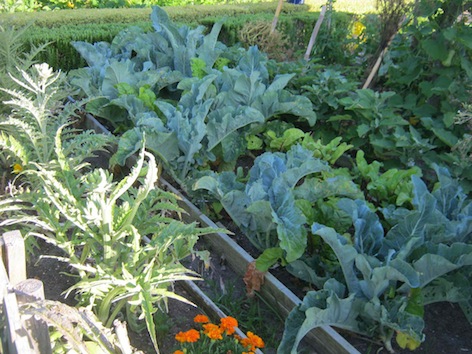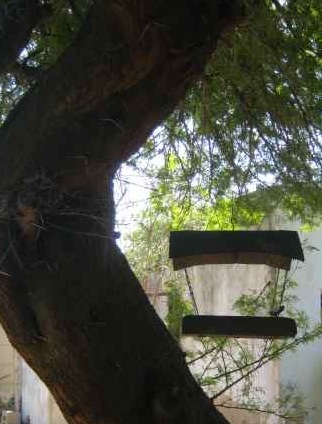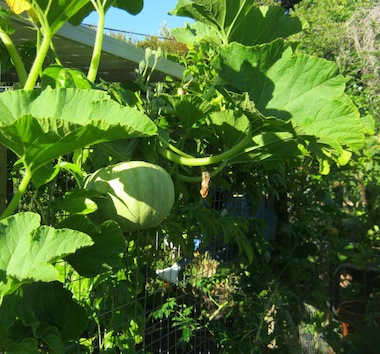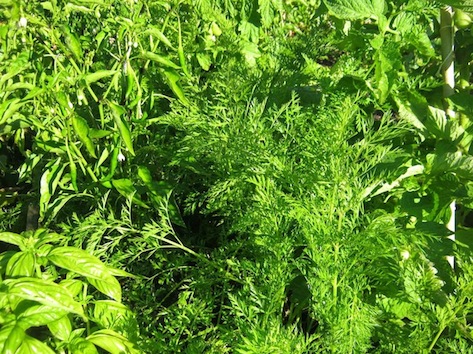Dear Reader, in this age of AI created content, please support with your goodwill someone who works harder to provide the human-made. Sign up at the top of the lefthand column or bottom of this page. You will receive my hand illustrated monthly newsletter RESTORE NATURE and access to the biodiversity garden design course as I write...and nothing else, I respect your time. I am also removing the advertizing as best I can as its become intrusive inappropriate and pays me nothing.
biological pest control and biodiversity

a permaculture garden using biodiversity and aromatic plants for biological pest control (Tagetes flowers, Rosemary hedge)
Biological pest control includes ecological measures and some quite high tech interventions. The principles behind it are encouraging predation of the pests by other animals, distracting or luring the pests away from your crops and decreasing the fertility of the pest, in this case fruit fly.Increasing the biodiversity of the garden is the first step to natural pest control, by encouraging the natural enemies of the pests to multiply. The way we can influence this as gardeners is with plant diversity, and increasing the habitats suited to insects, spiders and birds. For example, as opposed to naked earth, groundcover in orchards gives shelter to beetles, and ground and rove beetles feed on the
pupae of fruit flies, as do scratching insect eating birds. Birds and a diversity of insects and spiders like undisturbed areas of vegetation, hedges, creepers, groundcover and trees. Bird trays increase the garden’s birdlife. I put out birdseed, or hamster seed, scraps from the table like pumpkins skins and old fruit, and a little fat from boiling the dog’s bones. This and plenty of water, lead to us having masked weavers, two kinds of doves, two kinds of sparrows, wagtails, white eyes, ibis, Cape robins, and starlings constantly and a small changing population like sunbirds, when the aloes are flowering, sugarbirds and crows.

our bird feeder encourages bird diversity in the garden also helping with biological pest control
Flycatchers, Wagtails, swallows, spiders, robber flies and dragon flies catch the adult fruit flies, braconid wasps parasitize the eggs and ants and ground beetles eat the maggots.
You can introduce chickens which will also feast on the maggots in fallen fruit, and scratch up the ground to find pupae, and recently emerged adult flies. You can use mobile fencing if you need to confine the chickens.

a tangle of pumpkins and grenadillas growing, a chicken house, and over grown areas insure insect and bird diversity
You can liberate parasites of the fruit fly in the orchard, such as wasps which lay eggs in the larvae. In Hawaii the braconid Fopius arisanus and Pysttalia fletcheri were successful in halving the fruit fly population in a fruit fly suppression campaign that included biological pest control. Nematodes parasitic on the pupae can be released around fruiting plants on the ground. You will have to google to find
local suppliers of specific organisms that control fruit flies. In California it is the Environmental Protection Agency of Pesticide regulation Environmental Monitoring and Pest Management which can apparently supply you. Furthermore, irradiated and thus infertile male flies can be released. They will compete with other males to mate with the females and reduce the numbers of fruit flies. This has worked with a number of other insect pests, right up to tsetse flies and disease bearing mosquitos.

tomatoes, carrots, basil and capsicum growing together in lush abundance
The way you plant will also influence the fruit fly
population levels. Plant your crop plants in mixed rather than extensive
plantings, and according to permacultural pest management, the insect pests do
not find your crops as easily, as they are interspersed with other plants and
distracting strong smelling plants which may mask
the odours of crops they feed on. Also surround your fruit and vegetables with plants
known to lure fruit flies away from your crops, such as lush shady bushes in a
hot climate.
------
home page for many useful links about natural gardening
------
vegetable garden the cost effective way using natural materials
-------
the fruit fly life cycle, useful for choosing control measures
-------
download on fruit fly control in Hawaii
Restore Nature Newsletter
I've been writing for four years now and I would love to hear from you
Please let me know if you have any questions, comments or stories to share on gardening, permaculture, regenerative agriculture, food forests, natural gardening, do nothing gardening, observations about pests and diseases, foraging, dealing with and using weeds constructively, composting and going offgrid.
SEARCH
Order the Kindle E-book for the SPECIAL PRICE of only
Prices valid till 30.09.2023
Recent Articles
-
garden for life is a blog about saving the earth one garden at a time
Apr 18, 25 01:18 PM
The garden for life blog has short articles on gardening for biodiversity with native plants and regenerating soil for climate amelioration and nutritious food -
Cape Flats Sand Fynbos, Cape Town's most endangered native vegetation!
Apr 18, 25 10:36 AM
Cape Flats Sand Fynbos, a vegetation type found in the super diverse Cape Fynbos region is threatened by Cape Town's urban development and invasive alien plants -
Geography Research Task
Jan 31, 25 11:37 PM
To whom it may concern My name is Tanyaradzwa Madziwa and I am a matric student at Springfield Convent School. As part of our geography syllabus for this
"How to start a profitable worm business on a shoestring budget
Order a printed copy from "Amazon" at the SPECIAL PRICE of only
or a digital version from the "Kindle" store at the SPECIAL PRICE of only
Prices valid till 30.09.2023







